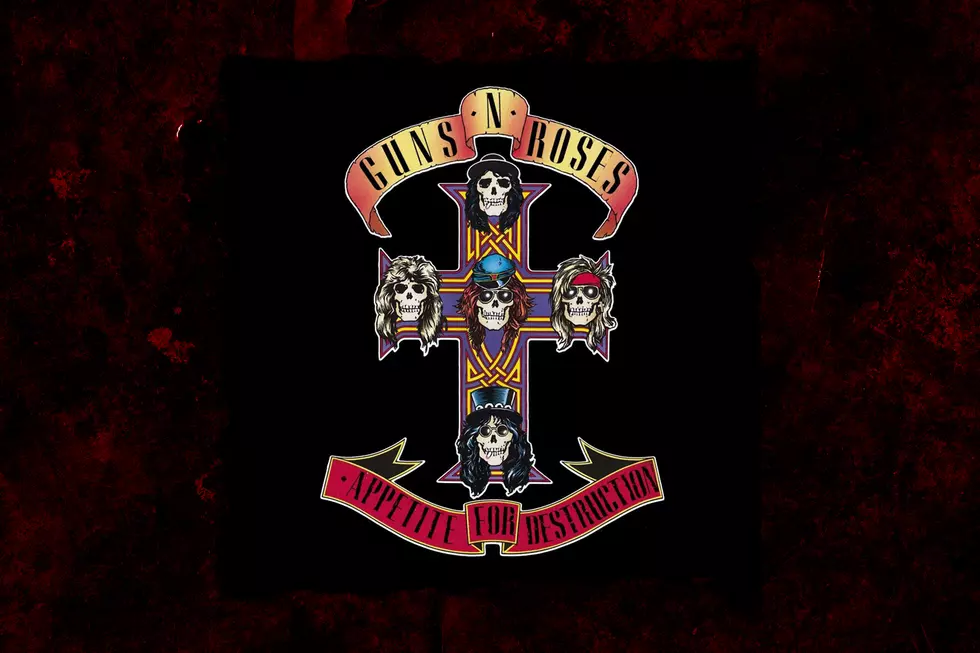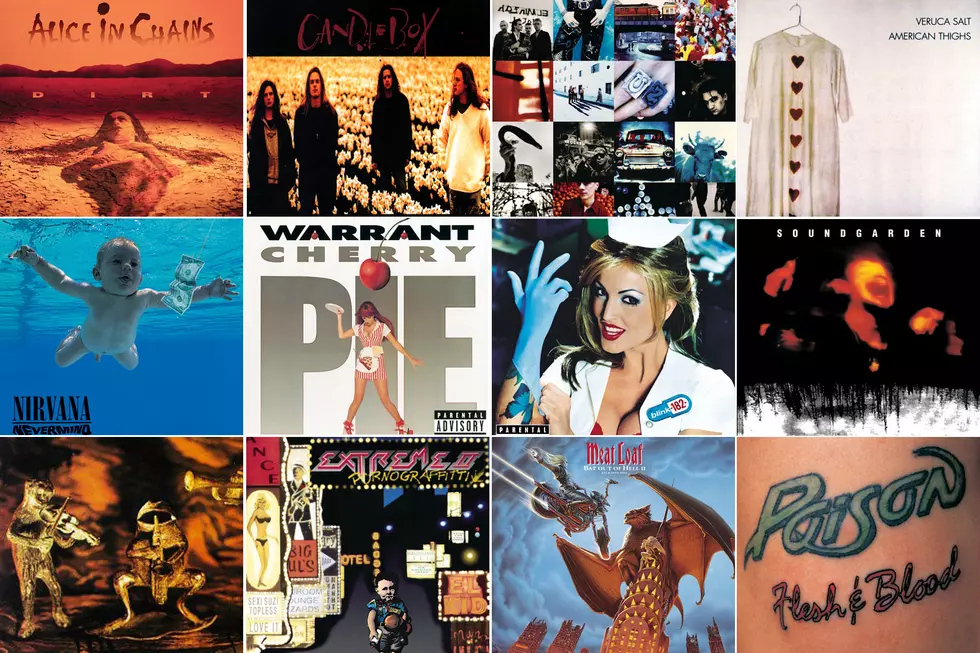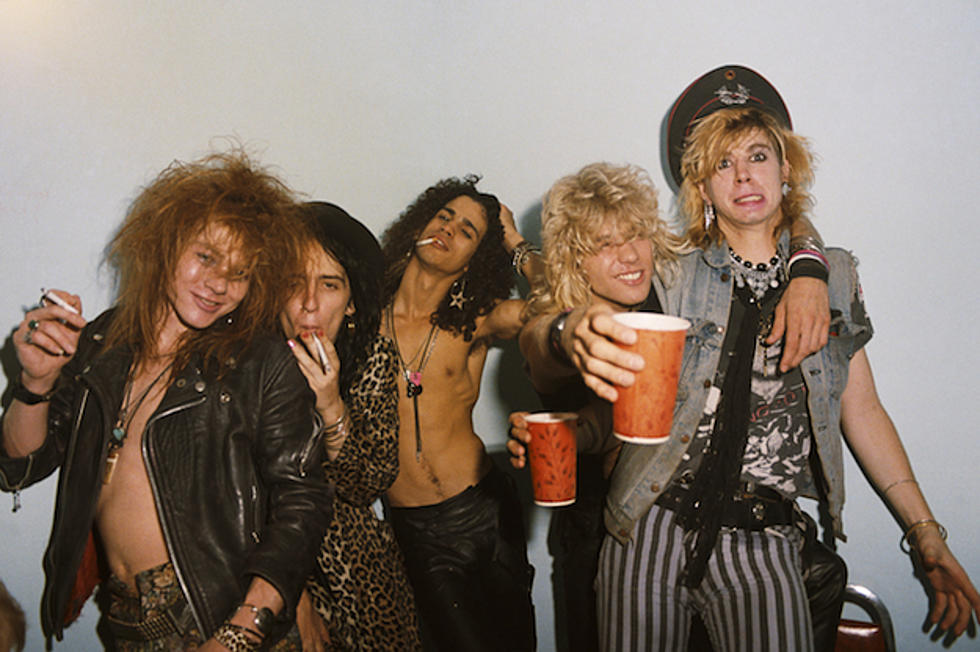
36 Years Ago: Guns N’ Roses Release ‘Appetite for Destruction’
“Back then, any one of them could come up with a riff and the rest of them would build on it," says former Guns N’ Roses friend and photographer Marc Canter. “They were totally on the same page as far as what they wanted to do with music and they needed each other to come up with the best songs.”
It was at this stage in their career that Guns N’ Roses wrote the songs for their explosive debut Appetite for Destruction, which came out on July 21, 1987. The title of the album was a reflection of the young, rambunctious rockers who had a magical chemistry, but were just as likely to spend their time taking drugs, drinking copiously, fighting one another or anyone in their way, getting arrested — or some combination of the above.
In an era of bad-boy rockers who weren’t terribly bad and wrote music that sounded too good, Guns N’ Roses were the genuine article. Their songs echoed with the love for rock and roll and the spirit of rebellion. When Geffen Records A&R man Tom Zutaut signed the band he had no idea what he had gotten into. No one else wanted GN’R because they were viewed as a liability, a band as likely to miss the show as perform a gangbuster set. Yet what Zutaut heard from vocalist Axl Rose, guitarists Slash and Izzy Stradlin, bassist Duff McKagan and drummer Steven Adler was inspiring and seemed to have the potential to be a profitable signing if they didn’t all die in an alcohol or drug related mishap.
“There are some bands that just can’t be stopped and you can sense it,” Zutaut says. “No amount of alcohol or drugs will slow them down. Guns N’ Roses were able to consume those things, yet, deliver at a live show and deliver in the studio. I don’t know if that makes them like gorilla glass on a cell phone or what, but there are plenty of bands that probably did less heroin than Guns N’ Roses and drank less alcohol, but imploded. For every Guns N’ Roses or Motley Crue that delivers, there’s probably 10 bands that are great but fall apart before they even become successful.”
Guns N' Roses, "Sweet Child O' Mine"
Impressed by Guns N’ Roses’ ability to endure under adverse conditions, Zutaut paid producer Spencer Proffer $15,000 to record “Nightrain” and “Sweet Child of Mine,” as a test and if the chemistry was good he would stay on for the debut. He also agreed to record a few extra songs with the band for the EP Live Like a Suicide, which Geffen released in England under a different label to pique interest in the band before they toured there.
“Proffer didn’t produce those songs, his engineer just recorded them,” Canter says. “GN’R recorded those songs in two or three weeks at a time when they were totally out of control. Even Axl wasn’t in the best shape, and he was the cleanest out of all of them. But he was fooling around with whatever they were doing. Once he saw that they were totally spun out, he just stopped. But nobody showed up on time. They’d throw up or pass out in the studio. But they got the songs done. They recorded nine songs in that studio including 'Heartbreak Hotel,' 'Don’t Cry' and 'Welcome to the Jungle.' But they only used those four. And then they used 'Shadow of Your Love' as a b-side.”
Guns N' Roses, "Welcome to the Jungle"
The writing sessions for Appetite for Destruction were brief and frantic, largely because they band was aching to get into the studio again and record their first album, but also because they wrote many of the songs on their debut before the band got signed. McKagan had “It’s So Easy,” Stradlin presented “Think About You,” “Anything Goes" was a Hollywood Rose tune and Slash, McKagan and Adler had started “Rocket Queen” when they were in the band Road Crew. “Mr. Brownstone,” a warning of sorts about the allure of heroin, came quickly to Slash and Stradlin, largely because they wrote from experience.
“Slash once told me, ‘You know, you do heroin once and it’s such a high, that you want to do it again,” says the band’s former European publicist Arlett Vereecke. “The problem with that is, the minute you do it a second time, you’re addicted to it. Axl wasn’t really doing drugs because of the medication he was on. He was not a big drinker either. People have a misconception about that, but he was the clean and mostly sober one, really. He wanted to preserve his voice, and he was serious about it.”
“Axl was the only sober one and he was surrounded by guys that were either strung out on heroin, drugged out on pills or in an alcoholic stupor, and that added to some of the friction in the band,” added Zutaut. “Axl didn’t want to be around the guys that were all fucked up.”
While Guns N’ Roses liked Proffer, they weren’t thrilled with his mix, so they searched for another producer. They recorded demos with Manny Charlton and talked to Paul Stanley of KISS, but he wanted to make changes to the drum set up that Adler unequivocally rejected. Robert John Lange exceeded the budget for the project, so the band went with Mike Clink, who had previously worked with Triumph. Guns N’ Roses started recording Appetite for Destruction in January, 1987. The band recorded the basic tracks in two weeks, then Slash recorded overdubs and Rose tracked his vocals.
The band finished most of their work between March and April at Rumbo Studios in Canoga Park, California, Take One Studio in Burbank, The Record Plant in Los Angeles and Can Am Studio in Tarzana. While the sessions were reasonably productive, there were days Rose wouldn’t show and then other times when the band’s handlers had to put out fires.
“Whenever they were home they’d get arrested just walking on the street,” Vereecke says. “At one point, Axl’s brother, Stewart, called me at five in the morning and said, ‘Good morning, Arlett.’ I said, ‘Really. It’s five in the morning. What’s up?’ He said, ‘Nothing really.’ I said, ‘It’s five in the morning. Something is up.’ He said, ‘Well, Axl would like to talk to you.’ I said, ‘Really? And what is he up to?’ And he said, ‘He’s in the cell next to me.’ I said, ‘What do you mean?’ He said, ‘Yes, can you arrange for a limo to pick us up in the morning? We’re in the drunk tank.’ That happened quite a bit, The police picked them up for drunkenness on the street and threw them in the drunk tank. Axl didn’t get drunk to the extent that the others did at all. But hey, he was still Axl, so he was an easy target.”
Guns N' Roses, "Rocket Queen"
The most dramatic and episode that happened while Guns N’ Roses recorded Appetite for Destruction happened when Rose recorded the intro for “Rocket Queen.” He wanted it to start with sex noises and he wanted them to be authentic. “Steven’s girlfriend at the time showed up at the studio and basically Axl said to her, ‘Hey, do you wanna fuck? I want to record it and put it on the record,” recalls Zutaut. “And she was like, ‘Sure.’ She was probably strung out on dope, but there was no consideration for the fact that she was in New York staying with her boyfriend, who was Steven Adler. So we mic’d up this sexual session between Axl and his drummer’s girlfriend, and we recorded it, and the results of it ended up on ‘Rocket Queen.’”
The band finished the overdubs in New York City at Mediasound Studios, where the album was mixed; mastering took place at Manhattan’s Sterling Sound.
Despite it’s fantastic assortment of tracks, which included the fire and thunder of “Welcome to the Jungle,” the anthemic grandeur of “Paradise City,” the bluesy bluster of “Nighttrain,” and the melodic sentiments of “Sweet Child O’ Mine,” Appetite for Destruction didn’t blow up right away. Since months after its release, the album seemed to be stalled at 250,000 in sales and MTV refused to play the video for “Welcome to the Jungle.” Executives at Geffen approached the band and their manager Alan Niven and suggested they stop touring and start preparing their second record.
“MTV was afraid that if they played GN'R they would get thrown off of local cable TV channels,” Zutaut says. “It was absurd because I knew this band would get such a huge boost if we could only get the video played. So I asked David Geffen if he could help me out and get MTV to play ‘Welcome to the Jungle.’”
“There was an incredibly gorgeous girl who worked with us and she promised she would dance naked on MTV President and CEO Tom Freston’s desk if they would play ‘Jungle,’” Niven says. “We went at them with a full-court press. At the same time, I sent a blistering letter to the head of programming about what they were playing and what they weren’t because I thought, ‘Fuck. They haven’t even looked at this video for six months. Are they ever going to view it?’ And bless his heart, the man took it in a very amused spirit and that turned his head around.”
Geffen convinced the head of MTV to air the video at 5AM on a Sunday as a personal favor. “That was all it took. They got so many requests after that they had to keep playing it.” Guns became a hit on MTV and a sensation live, and Appetite for Destruction turned into the best-selling American debut of all time, selling 18 million copies by September, 2008.
“There was nothing contrived about Guns N’ Roses,” and that’s why they were so popular,” Zutuat says. “They live the life, they were what they were, and everything they did was out of a musical passion and a musical desire to achieve their own vision, which was different than a lot of other people’s vision. They were the real deal and people loved them for it.”
Guns N' Roses, "Paradise City"
Loudwire contributor Jon Wiederhorn is the author of Raising Hell: Backstage Tales From the Lives of Metal Legends, co-author of Louder Than Hell: The Definitive Oral History of Metal, as well as the co-author of Scott Ian’s autobiography, I’m the Man: The Story of That Guy From Anthrax, and Al Jourgensen’s autobiography, Ministry: The Lost Gospels According to Al Jourgensen and the Agnostic Front book My Riot! Grit, Guts and Glory.
Every Guns N' Roses Song Ranked
More From Loudwire









